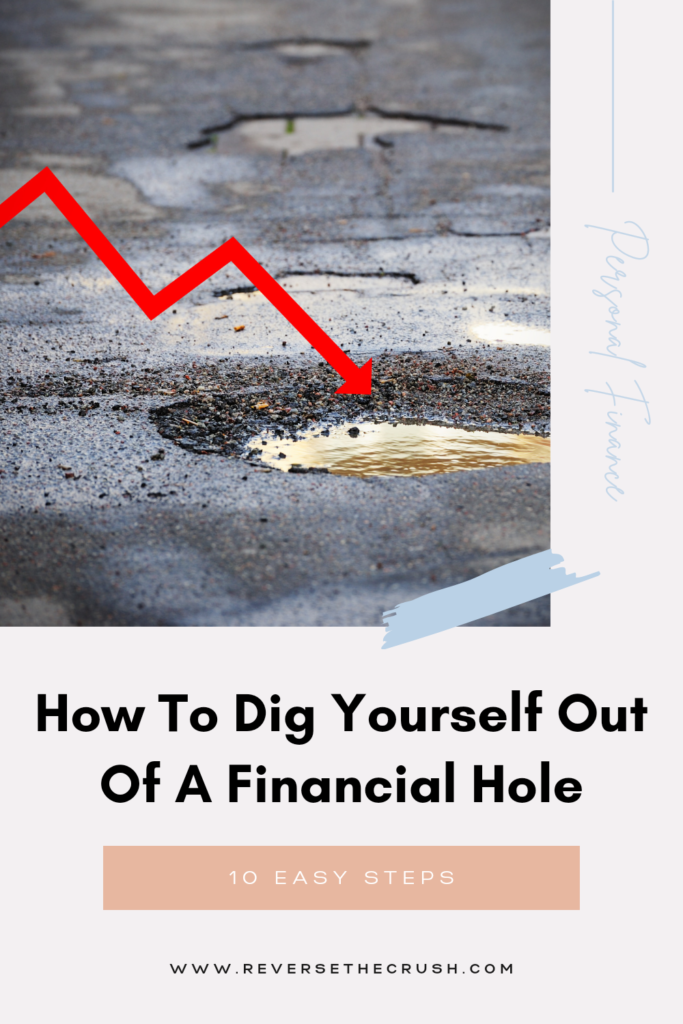How to dig yourself out of a financial hole: 10 easy steps to get out of a financial rut. The right attitude and these tips will get you out.
My wealth is growing by the month and I earn more than I ever have in my life, but that wasn’t always the case.
To put it bluntly, my financial situation was an absolute mess when I finished college.
I had $23,000 worth of student loan, credit card debt, and an overdue cellphone bill.
Furthermore, I had no savings and no job. I was in quite a financial rut.
I didn’t come from one of those families that could get me a job at the company they worked for either, nor was anyone going to help me out financially.
It was an uphill battle because I had to figure out everything on my own.
But to be perfectly honest, I wouldn’t have it any other way. The process I went through provided me with a unique perspective on money. I never wanted to be broke or struggle financially again after going through that!
In this post, I will show you how to dig yourself out of a financial hole in 10 easy steps.
First, let’s look at how to gain the right perspective to get you through this dilemma.
How To Dig Yourself Out Of A Financial Hole

1. Think Long Term – Where Do You Want To Be In 10 Years?
If you don’t find a way to dig yourself out of the hole you’ve got yourself in now, it’s only going to be more difficult in 10 years.
The world is changing at a rapid pace.
If you don’t act right away, it’s only going to get worse.
Now is the time to start thinking about where you want to be in 10 years.
Now is the time to start developing skills to be where you want to be down the road.
Time will go by faster than you think.
In turn, you must decide what you want your life to look like in 10 years.
Think about what job you want to have and what financial situation you want to be in.
Think long term instead of settling for temporary happiness.
2. Get Realistic
After you decide on where you want to be financially in 10 years, it’s time to get realistic.
It’s time to start acting like an adult.
It’s time to hold yourself accountable and take on responsibilities. Don’t blame your situation on anyone else.
Simply put, you have to get practical and avoid wishful thinking.
There’s no magical way to dig yourself out of a financial hole.
The only way out is to get realistic.
3. Understand You Have To Do Things You Don’t Want To Do
Unfortunately, life is not all rainbows and happy times.
You will have to do things in life that you don’t want to do to get where you want to be.
For example, the reason I get to work a high paying part-time job now is because I gained 10 years of experience working jobs I didn’t want to do.
Of course, I didn’t want to work in retail sales. But I knew that I needed that experience to eventually obtain a job at a bank.
Obviously, I didn’t want to work as an outbound salesperson for a bank. That was a brutal job. I had to make 60 outbound cold calls per day, and I had to sell banking products to people that were yelling at me. I didn’t want to do it, but I knew that it was my chance to get my foot in the door at a bank.
In short, you might have to do work you don’t want to do and make sacrifices you don’t want to make to get out of a financial rut.
The sooner you realize this, the sooner you will be able to start digging yourself out of a hole.
Basically, everyone has to put in 10 years of work they don’t want to do to gain enough experience to get their dream job.
Just accept it and be patient.
4. Review Your Expenses To See What Can Be Cut Out
Now that you have developed the right attitude to get out of your financial rut, it’s time to discuss your financial situation.
The first step is to take an honest look at your expenses.
Remember, you might have to make sacrifices to get to where you want to be.
So, start by looking at what you can cut out.
If you drink alcohol, stop drinking.
You can’t afford it.
If you smoke, you might need to stop smoking.
Alternatively, if you waste money on restaurants, quit it and look for ways to save money on groceries.
If you waste money on clothes and excessive shopping, realize you are not a celebrity and that you probably don’t look that good anyways.
Essentially, you need to stop spending money on things that are a waste of money.
5. Review Your Debts
After you get an idea of what expenses you can cut out, it’s time to review your debt situation.
In this step, your goal is to add up your debts to see where you stand. You also want to add up the total monthly payments to your debts to determine how much it costs.
Make sure to not overlook any debts. This is not the time to pretend that retail credit card doesn’t exist.
In some situations, ignorance is a bliss. This is not the case if you truly want to dig yourself out of a financial hole.
6. Track Your Income
In addition to adding up your debt and your monthly payments, you need to know how much money you have to put towards it.
As such, you need to track your monthly income to know where you stand.
In my opinion, you should focus on your net income (what you get after taxes). All that matters is how much money is deposited to your account per month.
If you have a salaried position, this step will be easy.
If your income fluctuates, look at your income over the past few months to get an average.
7. Create A Plan To Pay Debt Off
Once you know your expenses, total debts, and income, it’s time to create a plan to get it paid off.
Depending on how much debt you have, you may want to consider consolidating your debt. This way, you will only have one payment to worry about. It could make your debt easier to manage. You might want to consider this option if you have more than 5 credit cards to pay, or many different debts at multiple institutions.
Alternatively, if you can manage various debts on your own, you could consider using the debt snowball method. Essentially, this means you could focus on paying off debt with the lowest balance first to get the snowball rolling. So, if you have a credit line that you owe $1,000 to, a credit card with a $5,000 balance, and a car loan with a higher balance, you would focus on paying off the $1,000 credit line first. In short, it will be psychologically motivating to pay off the smallest balance first, because you will see the progress faster. Once the credit line is paid off, you can move on to the next smallest balance and so on.
Besides consolidating your debt or using the debt snowball method, the other option is to just pay off debt with the highest interest first. Ultimately, this method will allow you to pay the least interest over the long term. In turn, you will keep more of your hard-earned money in your own pocket.
8. Look For A Higher Paying Job Or An Extra Job
If you have a high paying job, you can pay off your debt quickly by putting a large amount of your income towards your debt.
But if you don’t earn a lot, you might want to look for a higher paying job or consider getting a second job.
This might not be what you want to hear, but sometimes you need to do things you don’t want to do to improve your life.
Desperate times call for desperate measures.
The fastest way to pay off your debt will be to get a bigger shovel, so to speak.
9. Take It One Step At A Time
Even though you will want to move on from this situation as soon as possible, you have to remember to be patient. This will be a process.
Everything good takes time.
You can’t just expect to get out of this situation in a few months. It might take years to figure out how to dig yourself out of a financial hole.
As such, you need to take it one step at a time.
Somehow, you must find a way to enjoy the journey.
To do this, you should celebrate your progress.
Keep track of your debts and be proud of yourself each time you pay a little more off.
Each time you pay off more debt, view it as one step closer to completely paying it off.
Turn it into a game if you have to.
Learn how to enjoy incremental progress.
10. Be Grateful, Some People Have It Worse
Of course, you don’t want to compare yourself to anyone else.
Everyone’s journey is different.
The only person you should compare yourself to is your former self.
However, at the time same, you need to find a way to be grateful for what you already have.
No matter how bad your financial situation is, there is someone out there that has it worse.
Some people live on the streets and they are only worried about where their next meal is going to come from.
It’s unlikely that someone in that situation even has internet access to read an article like this.
So, try to be grateful for what you do have and remember that you are lucky compared to someone.

How To Dig Yourself Out Of A Financial Hole – Final Thoughts
Now you know how to dig yourself out of a financial hole.
It’s not going to be easy, but the sooner you acknowledge it, the easier it will be to get on the right path.
If you think it’s too late, you should know that it’s not.
If you act now, you will be in a much better place financially than you would have been.
So, no matter how bad your situation is, the best course of action is to take control of the situation right now.
Related Articles On Personal Finance
Student Loan Debt: (11) Practical Ways To Quickly Pay It Off
Save Money On Groceries – 14 Highly Effective Ways To Save Money On Groceries
Things That Are A Waste Of Money: 11 Purchases That Force You To Work Longer
I am not a licensed investment or tax adviser. All opinions are my own. This post may contain advertisements by Monumetric. This post may also contain internal links, affiliate links to BizBudding, Amazon, Bluehost, and Questrade, links to trusted external sites, and links to RTC social media accounts.
Connect with RTC
Twitter: @Reversethecrush
Pinterest: @reversethecrushblog
Instagram: @reversethecrush_
Facebook: @reversethecrushblog
Email: graham@reversethecrush.com


 How To Save Money On Cable TV Internet and Phone
How To Save Money On Cable TV Internet and Phone
